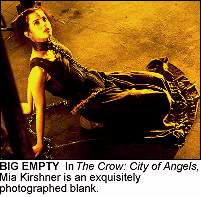![[Deep Focus]](../../flicker/logo.gif) |
|
|
THE CROW: CITY OF ANGELS | |
 |
Directed by Tim Pope Written by David S. Goyer Cinematography by Jean-Yves Escoffier Production Design by Alex McDowell Costume Design by Kirsten Everberg Starring Vincent Perez and Mia Kirshner USA, 1996.
GRADE: D+ |
|
"There will be another," the ads for this sequel proclaimed, and why not? True, Brandon Lee is dead, but there would be no reason for him to appear in a followup to 1994's The Crow, anyway. The idea of spinning artist James O'Barr's original comic book series into a sequel franchise revolves around the notion that a different startled soul would come back from the dead in each movie, taking its own righteous vengeance against the world. Given that basic framework, the story could move in any number of directions. Of course, it doesn't. Stubbornly, The Crow: City of Angels backtracks to the beginning of the previous film, when Lee's Eric Draven found himself drawn back out of his grave to do a Charles Bronson on the thugs who tortured him and his girlfriend to death. I remember the first film primarily as a harrowing exercise in brutality. In flashback, we see the most excruciating crimes exacted on Eric and his lover, and then we watch in real-time as Eric pays each perpetrator back in kind. It's loud and repetitive, true, a sadist's delight -- but it's also horrifying and fascinating. City of Angels gives us more of the same, but less skillfully. There's an audience guaranteed for a film like this, although bad reviews and poor word-of-mouth will likely ensure that it won't be much of a success. In fact, Miramax subsidiary Dimension Films was so fearful of the critical reaction to this picture that reviewers were shut out of advance screenings. (I've never understood the reasoning behind this tactic, since good notices have never been key to the success of movies like The Crow.) So much for any confidence in the worthiness of their followup. This time, Ashe (French-accented actor Vincent Perez) is retrieved from his watery death (he and his young son were shackled together, shot, and then thrown off a pier) by the crow who serves as his link between the worlds of the living and the dead. Perez might have some screen presence if he's given something to do with himself, but here he's simply thrown in front of the camera as a pretty face. At first, he's shivery and frightened, but he quickly recovers from the shock of his own death and becomes a badass biker from beyond the grave. He's befriended by Sarah (Mia Kirshner), presumably an older version of the child who narrated the first film. Kirshner, so beguiling in Exotica, is here an exquisitely photographed blank. Tattooed with angels' wings, Sarah is just about as lovely as women come, but she serves no purpose, not even as seductress. The gang of punks who killed Ashe are ostensibly commanded by Judah (Richard Brooks), but a far more interesting choice as leader would have been Iggy Pop, who plays a gaunt fellow named Curve. Iggy, all bones, veins, and drawl, is the only one who seems to have shared in the aesthetic of ruin that defines this film. Like all good things here, he's dispatched too soon and without much imagination. In the meantime, we're subjected to tedious glimpses of Judah's compound, where bondage is the order of the day and hot wax is poured over naked bodies in S&M; fantasies that would seem shy of the cutting edge even if they weren't distinctly secondhand. Even the soundtrack is tired. More than anything I've seen from Hollywood lately, City of Angels smacks baldly of product -- it's a movie with a lousy script but a great look. Critics have been quick to fault the direction of MTV veteran Tim Pope, but his work isn't that bad per se. He's got a good eye, and some intriguing visual ideas -- if anything, this movie has a few too many scenes of ridiculously striking imagery. His major stylistic failing is that he can't seem to direct an action scene, and the quick, nonsensical cutting that ensues is reminiscent of a low budget kung fu movie. But as director, he must also shoulder the blame for the little screenplay that wasn't, the performers who couldn't, and an apparent lack of ideas on the parts of everyone involved. Who bought David S. Goyer's anemic script, anyway? The producers of this Crow were either too dim to realize their story was doomed to be a hollow rehash, or too cynical to figure their audience would know the difference. | |
 | |